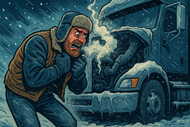Winter Diesel Prep: Pre-Season Checklist for Owner-Operators
Posted by Sean
Table of Contents
-
Why Winter Maintenance Matters
-
Fluids and Filters
-
Battery and Electrical System
-
Fuel System and Additives
-
Cooling System Check
-
Engine Block Heater
-
Belts, Hoses, and Air Systems
Why Winter Maintenance Matters
Cold weather stresses every system on a diesel. Oil thickens, batteries lose cranking amps, moisture freezes, and fuel can gel. The mission is simple: catch problems before winter strands you.
At Engine Parts Canada, we’ve seen how a little pre-season prep saves serious downtime when temperatures drop. The cost of prevention is always less than the cost of a tow.
Here's a winter-prep reminder/checklist for ya.
Fluids and Filters
Fluids are the lifeblood of a diesel engine.
-
Engine Oil: Run the manufacturer-recommended winter viscosity. Many Canadian operators switch to 5W-40 synthetic for faster flow in the cold.
-
Fuel Filters: Replace before winter. Ice or gelled fuel plugs filters fast, especially if they’re already half restricted.
-
Air Filters: Check for debris and restriction. Cold weather often means longer idles, so airflow matters.
-
Transmission and Differential Fluids: Check levels and service intervals. Use OEM-approved fluids rated for cold climates.
Battery and Electrical System
Cold starts demand maximum amperage.
-
Load Test Batteries: Replace anything marginal. Batteries that “worked fine” in summer often fail in winter.
-
Clean Terminals and Grounds: Corrosion adds resistance and drops voltage.
-
Inspect Cables: Look for cracked insulation or loose crimps.
-
Check Alternator Output: Voltage and amperage must meet spec to support heaters and lighting loads.
Fuel System and Additives
Diesel can wax and gel quickly once it hits sub-zero temps.
-
Winter-Blend Diesel: Buy from high-turnover stations that switch to winter grade early.
-
Anti-Gel Additives: Start using them before freezing temps. Once fuel gels, additives can’t fix it.
-
Drain Water Separators: Water freezes into solid blockages.
-
Keep Tanks Full: Less air space means less condensation and water buildup.
Cooling System Check
Coolant condition affects both freeze protection and corrosion resistance.
-
Test Freeze Point and pH: Use test strips or a refractometer.
-
Check Hoses and Clamps: Replace any that are soft, swollen, or cracked.
-
Inspect Radiator Cap: Proper pressure maintains correct boiling and flow characteristics.
-
Don’t Ignore the DEF System: Frozen DEF is common. Verify the tank heater and lines work properly.
Engine Block Heater
A working block heater is essential for reliable cold starts. It preheats coolant and shortens warm-up time, reducing engine wear.
Make sure to:
-
Test it early to confirm it’s drawing power.
-
Inspect the plug and cord for wear or corrosion.
-
Use a heavy-duty outdoor-rated extension cord.
-
Set a timer to run it a few hours before start-up instead of all night.
Belts, Hoses, and Air Systems
Rubber and air lines take a beating in freezing weather.
-
Inspect Belts for Wear: Glazed or cracked belts slip under load.
-
Replace Air Dryer Cartridge: Moisture in the air system can freeze, locking brakes or valves.
-
Drain Air Tanks: Regular draining prevents ice buildup in lines.
-
Check for Leaks: Especially around fittings and quick connects.
Final Thoughts
A few hours in the shop now can save a night in the breakdown lane later.
EPC carries filters, sensors, gaskets, and replacement components from trusted brands to help you prep for the season. If you need the right parts for your engine, visit reach out to our diesel engine parts team before winter hits hard. ❄
FAQ
When should I start winter prep?
When overnight lows hit around 10°C, it’s time to check fluids, filters, and batteries so you’re ready for the first freeze.
How often should coolant be replaced?
Most extended-life coolants last up to 5 years, but test annually. Additives deplete over time even if color looks fine.
Do fuel additives really help with gelling?
Yes. Quality additives modify the wax structure in diesel to lower the pour point and prevent filter plugging.
Should I idle to warm up my engine in cold weather?
Short idles are fine, but extended idling causes soot buildup. Use your block heater instead whenever possible.
What’s the number one winter failure point?
Electrical issues, especially weak batteries or bad grounds, top the list. The cold exposes marginal components instantly.



